Contact us
Location
Peričićeva 1,
21000 Split – Croatia
21000 Split – Croatia
Get in touch
The story of Split began 1,700 years ago.
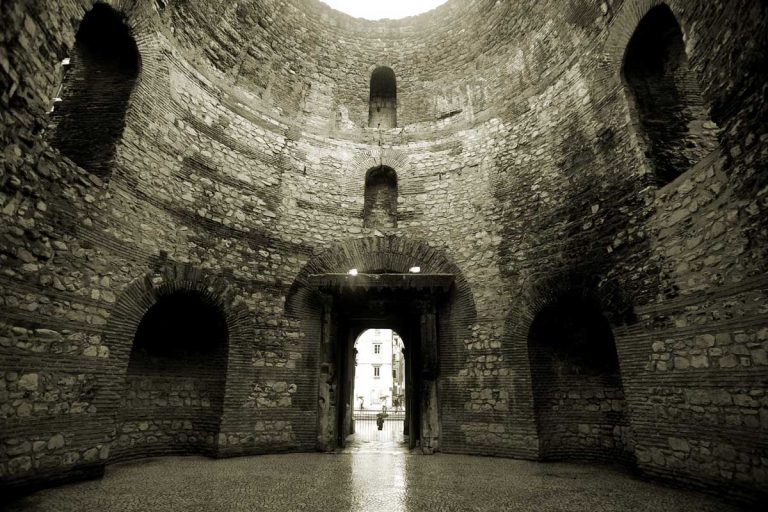
one of the best preserved monuments of Roman architecture in the world. The Emperor’s Palace was built as a combination of a luxury villa – a summer house and a Roman military camp, divided into four parts by two main streets. The southern part of Diocletian’s palace was intended for the emperor, his apartment and the relevant state and religious ceremonies, while the northern part was for the imperial guard. In the eastern area, a monumental building (called Diocletian’s Mausoleum) has been preserved to this day, in which the busts of Diocletian and his wife Prisca have been preserved, while the central figure has disappeared. The palace is rectangular with four large towers at the corners, gates (Golden, Silver, Iron and Brass gates) on each of the four sides and with four smaller towers on the walls. The historical part of Split with Diocletian’s Palace is included in the UNESCO World Heritage List.
represent one of the best preserved ancient complexes of its kind in the world. In Roman times, their function was to raise the space of the emperor’s apartment on the floor above; also, they served as the storage space of the Palace. Today, these ground-floor halls are entered through the Brass Gate, from the Riva or the staircase from the Peristyle. In the early Middle Ages, one part was used for housing, and parts of the oil and wine production plant were found in one hall. The basements are still full of life today. Painting and sculpture exhibitions, theatre performances, fairs and many other social and cultural events are regularly organised there.
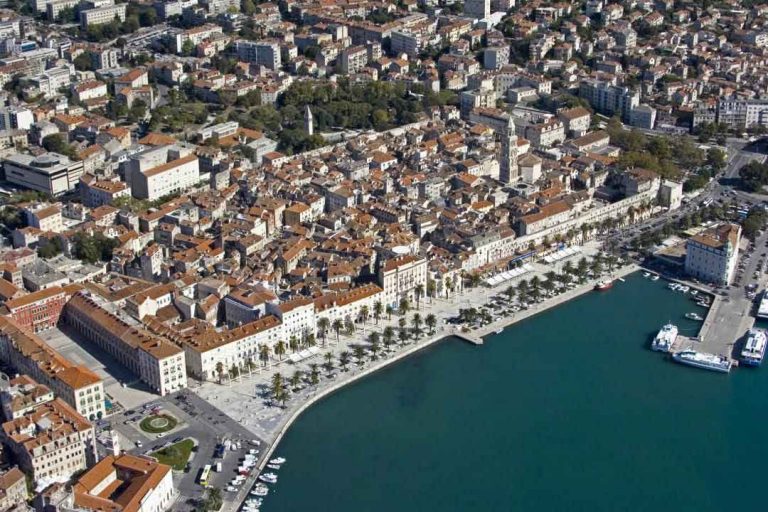
Today’s Split Cathedral was built in the 4th century as the mausoleum of the Roman emperor Diocletian and is the oldest cathedral in the world. The Cathedral of St. Dominus is today, above all, a liturgical place which millennial continuity is best reflected in the Sunday Mass and the renewed splendour of the procession on the day of the patron of Split, St. Domnius. In the cathedral there are altars with the relics of St. Domnius and St. Anastasia, martyrs executed in Solin. The most famous part of the cathedral are the gates made in 1214 by Andrija Buvina from Split, who carved 28 scenes of Jesus’ life in walnut.
the most original Dalmatian medieval building the construction of which began in the middle of the 13th century and lasted until the middle of the 16th century. Due to the extremely long period of construction, it is a combination of Romanesque and Gothic architecture, but both styles are in excellent harmony. At the turn of the 19th and 20th centuries, the belltower was thoroughly renovated and slightly altered. Today, it is possible to climb the stairs to the top of the belltower, where there is a spectacular view of the whole of Split.

is the first part of the imperial corridor that led from the Peristyle to Diocletian’s residential part of the Palace. The old imperial lobby still looks monumental today. Southeast of the Vestibule is a medieval area, within which the oldest early Romanesque house from the tenth century is located. At the other end of the square, in the former church of St. Andrew, built in the seventh century on the site of the imperial chambers, there is an Ethnographic Museum.
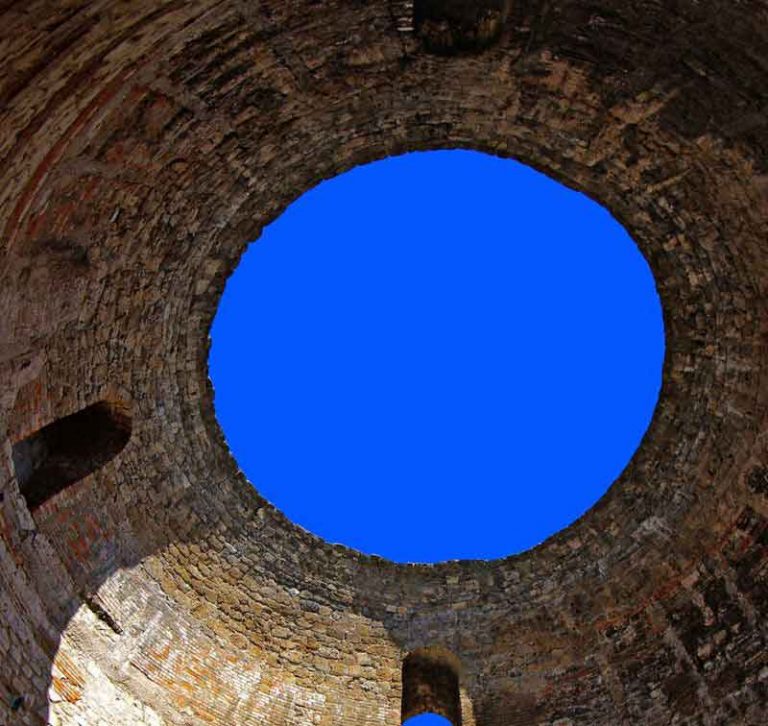
dedicated to the supreme Roman deity and Diocletian’s divine father Jupiter. During late Ancient times and the Middle Ages, the temple was turned into a baptistery dedicated to St. John the Baptist, and the crypt was dedicated to St. Thomas. A baptismal font, originally located in the cathedral, was erected in the former church at the beginning of the 13th century. On one of the plaques there is a depiction of a Croatian king (Peter Krešimir IV. or Zvonimir), the earliest depiction of a European king in a medieval stone sculpture. Today, the Baptistery is dominated by the Secession sculpture of St. John the Baptist, the work of Ivan Meštrović, and in front of it one of the twelve granite sphinxes that Diocletian brought from Egypt is placed.
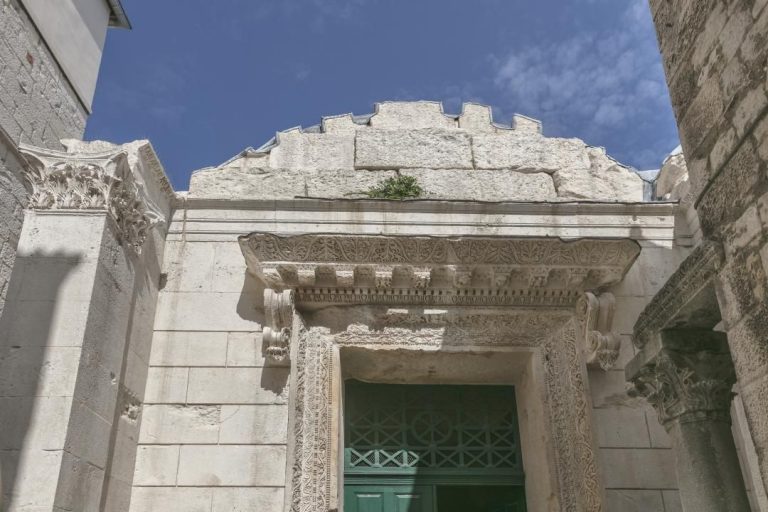
as the central square of the Palace, is located in the part where several temples were built, intended for Emperor Diocletian, celebrated as the living son of Jupiter. The emperor appeared under the arch of the central part of the protiron where his people approached him. With the construction of a new town square with the town hall (Pjaca) in 13/14 century, the Peristyle became a religious centre. Thanks to its unique beauty and unusual acoustics, the Peristyle is today an ideal theatre stage where a rich city life takes place. Drinking coffee on the stairs around the Peristyle is a unique experience, one of the closest contacts a modern man can have with ancient heritage, while a 3,500-year-old and beautifully preserved sphinx is watching over the Peristyle.
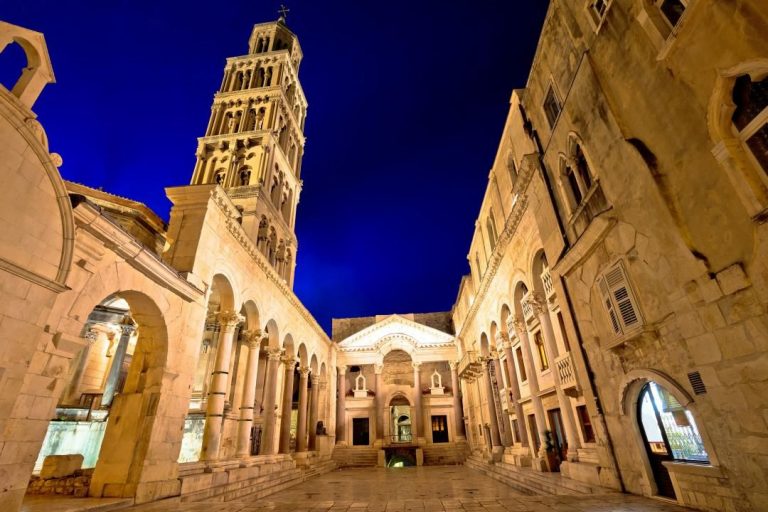
This post is also available in: CRO
Development by Black & white solutions
© Marvie Hotel & Health / All Rights Reserved 2021.
Jan 01 — Apr 30
May 01 — Jun 30
Jul 01 — Aug 31
Sep 01 — Oct 31
Nov 01 — Dec 31
69 €
139 €
174 €
139 €
69 €
Jan 01 — Mar 31
Apr 01 — Apr 30
May 01 — Jun 14
Jun 15 — Sep 14
Sep 15 — Oct 31
Nov 01 — Dec 31
150 €
210 €
252 €
320 €
252 €
150 €
I hereby give consent that my personal data (name, surname, address, e-mail address) are used in order to provide answer to my request. KRUPA d.o.o., Split, Dračevac 11 will use my personal data only for the indicated purpose and will not disclose them to third parties; the data shall be used until the completion of information procedure. I am aware of the right to request from KRUPA d.o.o. the following: access to my personal data, data correction, data deletion, data processing limitation, the right to submit objection to processing, the right to data transferability, the right to submit an objection to the competent authority if I have reasons to believe that there has been any kind of breach regrading my personal data processing using contact form on the website www.marviehotel.com or via mail on Peričićeva 1.
Jan 01 — Apr 30
May 01 — Jun 30
Jul 01 — Aug 31
Sep 01 — Oct 31
Nov 01 — Dec 31
69 €
139 €
174 €
139 €
69 €
Jan 01 — Apr 30
May 01 — Jun 30
Jul 01 — Aug 31
Sep 01 — Oct 31
Nov 01 — Dec 31
86 €
157 €
209 €
132 €
86 €
Jan 01 — Apr 30
May 01 — Jun 30
Jul 01 — Aug 31
Sep 01 — Oct 31
Nov 01 — Dec 31
113€
184 €
237 €
160 €
113 €
Jan 01 — Mar 31
Apr 01 — Apr 30
May 01 — Jun 14
Jun 15 — Sep 14
Sep 15 — Oct 31
Nov 01 — Dec 31
130 €
200 €
231€
298 €
231 €
130 €
Jan 01 — Mar 31
Apr 01 — Apr 30
May 01 — Jun 14
Jun 15 — Sep 14
Sep 15 — Oct 31
Nov 01 — Dec 31
120 €
170 €
194 €
265 €
194 €
120 €
Jan 01 — Mar 31
Apr 01 — Apr 30
May 01 — Jun 14
Jun 15 — Sep 14
Sep 15 — Oct 31
Nov 01 — Dec 31
150 €
210 €
252€
320 €
252 €
150 €
Jan 01 — Apr 30
May 01 — Jun 30
Jul 01 — Aug 31
Sep 01 — Oct 31
Nov 01 — Dec 31
113€
184 €
237 €
160 €
113 €
Jan 01 — Mar 31
Apr 01 — Apr 30
May 01 — Jun 14
Jun 15 — Sep 14
Sep 15 — Oct 31
Nov 01 — Dec 31
120 €
170 €
194 €
265 €
194 €
120 €
Jan 01 — Mar 31
Apr 01 — Apr 30
May 01 — Jun 14
Jun 15 — Sep 14
Sep 15 — Oct 31
Nov 01 — Dec 31
110 €
150 €
179€
243 €
179 €
110 €
Jan 01 — Mar 31
Apr 01 — Apr 30
May 01 — Jun 14
Jun 15 — Sep 14
Sep 15 — Oct 31
Nov 01 — Dec 31
130 €
200 €
231€
298 €
231 €
130 €
Jan 01 — Mar 31
Apr 01 — Apr 30
May 01 — Jun 14
Jun 15 — Sep 14
Sep 15 — Oct 31
Nov 01 — Dec 31
200 €
280 €
347€
430 €
347 €
200 €
Jan 01 — Mar 31
Apr 01 — Apr 30
May 01 — Jun 14
Jun 15 — Sep 14
Sep 15 — Oct 31
Nov 01 — Dec 31
250 €
350 €
431€
540 €
431 €
250 €
Jan 01 — Mar 31
Apr 01 — Apr 30
May 01 — Jun 14
Jun 15 — Sep 14
Sep 15 — Oct 31
Nov 01 — Dec 31
90 €
130 €
159 €
223 €
159 €
90 €
Jan 01 — Apr 30
May 01 — Jun 30
Jul 01 — Aug 31
Sep 01 — Oct 31
Nov 01 — Dec 31
86 €
157 €
209 €
132 €
86 €
Jan 01 — Mar 31
Apr 01 — Apr 30
May 01 — Jun 14
Jun 15 — Sep 14
Sep 15 — Oct 31
Nov 01 — Dec 31
90 €
130 €
159 €
223 €
159 €
90 €